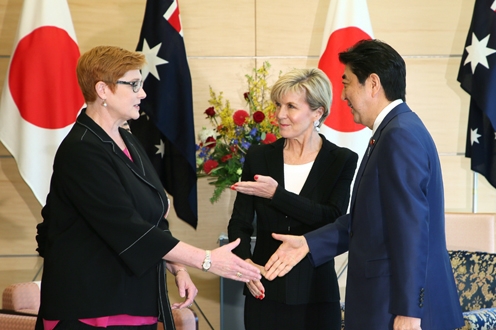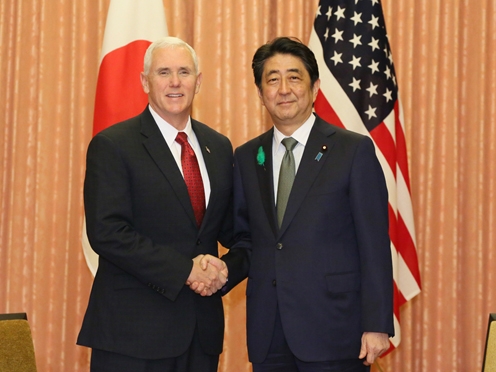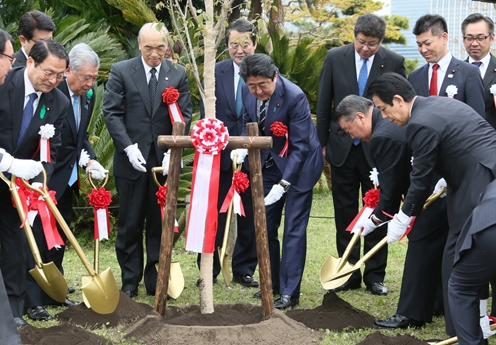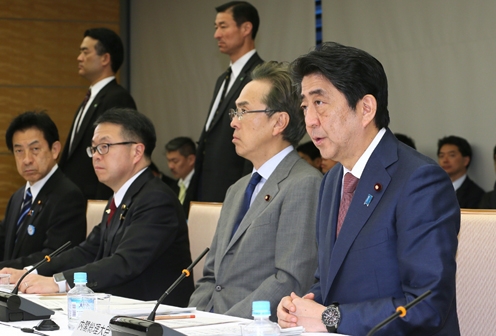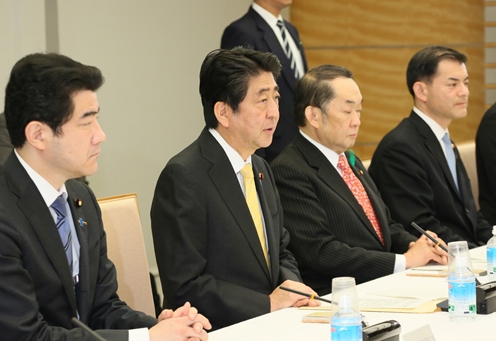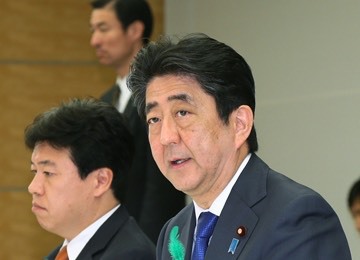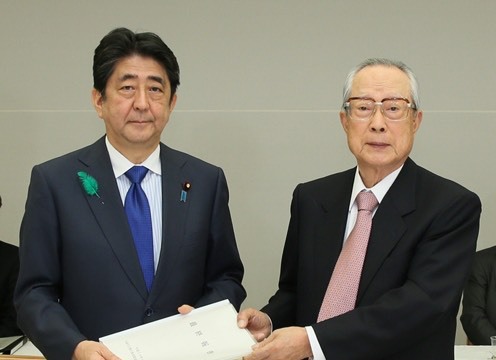Japan-U.S. Summit Telephone Talk
Foreign Affairs, Monday, April 24, 2017
On April 24, commencing at 10:34 a.m. for approximately 30 minutes, Mr. Shinzo Abe, Prime Minister of Japan, held a telephone talk with the Honorable Donald Trump, President of the United States of America. The overview of the talk is as follows.
Prime Minister Abe stated that he highly valued the stance of President Trump, which is exhibited through his words and actions, that all options are on the table. The two leaders fully agreed to strongly urge North Korea, which is still repeatedly undertaking acts of dangerous provocation, to exercise self-restraint.
The two leaders, regarding the issue of North Korea, agreed that the two countries will call on China to play a larger role since China's role is important, and continue to coordinate closely together.
Courtesy Call from Australia’s Minister for Foreign Affairs and Minister for Defence
Cabinet Secretariat, Thursday, April 20, 2017
Prime Minister Shinzo Abe received a courtesy call from the Hon Julie Bishop MP, Minister for Foreign Affairs of the Commonwealth of Australia, and Senator the Hon Marise Payne, Minister for Defence of the Commonwealth of Australia, at the Prime Minister’s Office.
Luncheon with U.S. Vice President Pence Hosted by the Prime Minister
Cabinet Secretariat, Tuesday, April 18, 2017
[Provisional Translation]
Prime Minister Shinzo Abe hosted a luncheon for the Hon. Mike Pence, Vice President of the United States of America, at the Prime Minister's Official Residence.
The Prime Minister said in his address,
"I would like to extend my heartfelt welcome to Vice President Pence on his visit to Japan.
With the increasingly severe situation surrounding North Korea, Vice President Pence's visit to Japan comes at an extremely appropriate time.
Through this visit to Japan of Vice President Pence, I would like to clearly demonstrate that the robust bond of the Japan-U.S. Alliance is unwavering.
It goes without saying that we must seek diplomatic efforts and a peaceful settlement of the issue. At the same time, dialogue for the sake of dialogue has no value, and it is also necessary to exercise pressure so that North Korea engages in serious dialogue.
Japan values that the Trump administration no longer sticks to the concept of strategic patience but addresses issues of North Korea based on the concept that all options are on the table.
In any event, I would like to reiterate my appreciation to you, Vice President Pence, for visiting Japan, along with your wife and daughter. Thank you."
Ceremony for the 70th Anniversary of the Coming into Effect of the Constitution of Japan
Cabinet Secretariat, Wednesday, April 26, 2017
[Provisional Translation]
Prime Minister Shinzo Abe attended a ceremony to commemorate the 70th anniversary of the Constitution of Japan coming into force, at the Parliamentary Museum.
After planting a commemorative tree, the Prime Minister said in his congratulatory address at the ceremony,
"Today, on the occasion of this ceremony to commemorate the 70th anniversary of the Constitution of Japan coming into force, I would like to make a few congratulatory remarks as Prime Minister.
The Constitution of Japan came into force soon after the end of the war, and 70 years have passed since then. During this time, under this Constitution, Japan resolutely raised itself to its feet amidst the postwar ruins and extreme poverty, and through the untiring efforts of our predecessors, built a peaceful and abundant country that has made unstinting contributions to global peace and prosperity.
While feeling quietly proud of this course we have taken, we will now embark on the next 70 years. Once again I would like to express my appreciation for the hard work of our predecessors, as well as express my respect for the efforts of the Diet, as the highest organ of state power, to establish and develop the constitutional government.
During the last 70 years, the situation and circumstances have changed dramatically both in Japan and overseas. These changes include: the coming of a society with a rapidly declining birthrate and aging population and decreasing population; the economic stagnation caused by deflation after the collapse of the economic bubble, which continued for almost 20 years; the end of the Cold War; and the worsening of the security situation around Japan, including the development of nuclear weapons and missiles by North Korea. We who are living today must follow on from our predecessors and squarely confront these difficult issues, and fulfill our responsibilities toward the future. We will create a society in which everyone can find fulfilment and fully exercise their capabilities, and build an abundant and peaceful society where the people can live with peace of mind. I renew my determination to achieve such a society on this milestone year.
A Constitution describes a country's future and outlines its ideals. We who are living today are standing at a turning point of the era. It is demanded of us to create the ideals of the new era while deeply etching in our hearts the universal values that are the basic principles of the Constitution of Japan-the sovereignty of the people, respect for basic human rights, and pacifism. I believe that this is what is required in this era. I perceive that this spirit will lead to carving out a future for Japan.
I expect that today's ceremony will provide an opportunity for each person to reflect on the universal values that are the basic principles of the Constitution of Japan, as well as on Japan's future. I would like to end my congratulatory remarks by sincerely hoping that the Diet, as the highest organ of state power, will continue to further develop Japan's constitutional government. Thank you."
Meeting of the Council on Economic and Fiscal Policy
Cabinet Secretariat, Tuesday, April 25, 2017
[Provisional Translation]
Prime Minister Shinzo Abe held the sixth meeting in 2017 of the Council on Economic and Fiscal Policy at the Prime Minister's Office.
At the meeting, there was discussion on the ideal state of investment in human resources and of the learning and education fields, and that of vitalizing local economies and social infrastructure development.
Based on the discussion, the Prime Minister said,
"Today, firstly we discussed the ideal state of investment in human resources and of the learning and education fields.
Investment in human resources and improving the quality of education is important in increasing labor productivity and accelerating the positive cycle of growth and distribution.
We heard the views of private sector members, in particular on university reform.
I would like the relevant ministers to deepen the discussion, taking into consideration the views of the private sector members.
Secondly, we discussed the ideal state of vitalizing local economies and social infrastructure development. We heard the view of private sector members that it is important to realize social infrastructure development whereby regional productivity increases, through the advancement of public private partnerships and private finance initiatives (PPP/PFI) and the revitalization of land use.
I would like for PPP/PFI to be implemented under the leadership of Minister Ishihara, and for the Chief Cabinet Secretary and the relevant ministers to work together to rapidly achieve results in the revitalization of land use."
Council for the Protection of Information
Cabinet Secretariat, Monday, April 24, 2017
Prime Minister Shinzo Abe held the sixth meeting of the Council for the Protection of Information at the Prime Minister's Office.
Council for Science, Technology and Innovation
Cabinet Secretariat, Friday, April 21, 2017
[Provisional Translation]
Prime Minister Shinzo Abe held the 29th meeting of the Council for Science, Technology and Innovation at the Prime Minister's Office.
During the meeting, discussions were held on target areas and the promotion system for the Program to Expand Investment in Research and Development in the Public and Private Sectors, the state of discussion on the Comprehensive Strategy on Science, Technology and Innovation 2017, the evaluation for the research and development (R&D) projects of national importance, and promotion of Society 5.0 and Government R&D investment goals.
Based on the discussion, the Prime Minister said in his address,
"Today, we approved a specific path for the achievement of our goal of bringing the ratio of the Government's R&D investments to GDP to one percent while ensuring the consistency of the investments with the Plan for Economic and Fiscal Revitalization.
I request that the relevant ministers work hard to expand R&D investments in line with the decision today so that we will be able to steadily achieve this goal during the time period of the Fifth Science and Technology Basic Plan.
Regarding Government research and development, we have decided the target areas that are expected to be highly effective in generating private sector investment and contribute to making finances more efficient. Next fiscal year, we will steadily advance the Strategic Innovation Creation Program (SIP) and create a new type of promotional expenses to encourage investments in these areas.
Chairman Sakakibara of Keidanren made a strong statement saying that the business world will exert efforts in line with government initiatives and aim to bring the ratio of private sector investments in R&D to GDP to three percent.
The Government and private sector will cooperate in a unified manner to aim to bring Japan's ratio of R&D investment to GDP up to the globally leading level of 4 percent. Through these efforts, we will make Japan an innovation-friendly country with the greatest research environment in the world."
Meeting of the Advisory Council on Easing the Burden of the Official Duties and Public Activities of His Majesty the Emperor
Cabinet Secretariat, Friday, April 21, 2017
[Provisional Translation]
Prime Minister Shinzo Abe held the fourteenth meeting of the Advisory Council on Easing the Burden of the Official Duties and Public Activities of His Majesty the Emperor at the Prime Minister's Office.
During the meeting, the final report of the Advisory Council on Easing the Burden of the Official Duties and Public Activities of His Majesty the Emperor was approved.
After receiving the final report, the Prime Minister said,
"I would like to express my sincere gratitude for the compilation of this final report today. As I said at our first meeting, this is a matter relating to the foundation of our state, and is a crucial issue in light of our long history and for our future. These thoughts have grown stronger as the discussions in these meetings have deepened.
Based on what was communicated recently to the Government from the compilation of the discussions that took place in the Diet, this final report organizes important topics such as the position and title of His Majesty the Emperor in the case of His Majesty's abdication.
Based on the compilation of discussions in the Diet, going forward the Government will exert every effort to advance the formulation of a bill to realize the abdication of His Majesty while referencing this final report and quickly submit it to the Diet.
You have all worked truly earnestly on this extremely important matter relating to the foundation of our state. You have completed this final report in the midst of the tremendous interest and great variety of opinions being offered by the public on this issue. This result is thanks to each person here, including Chair Imai, as you have all exercised deep insight based on your individual judgement, and had calm yet passionate discussions. The fruit of these efforts is something that only the members of this Council could have produced. I would like to express my heartfelt respect and, once again, my gratitude. Thank you very much."



























